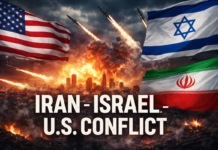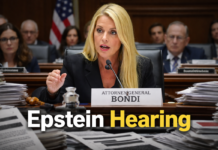Trump Bold Move on Student Visas – In a controversial move that is certain to spark intense debate, U.S. President Donald Trump is preparing to sign an executive order this week aimed at curbing antisemitism and targeting individuals associated with pro-Palestinian protests that support Hamas. The administration’s stance is clear: if you’re a foreign national participating in protests that back terrorism or extremist ideologies, especially on American college campuses, you risk losing your student visa and possibly being deported. This new policy has raised significant concerns, particularly regarding its potential impact on the U.S. academic environment and the broader implications for free speech.
The Executive Order: A Bold Response to Recent Protests
The White House recently outlined the provisions of the executive order, which will include several major components, the most controversial of which is the targeting of non-citizen college students and other resident aliens who have supported pro-Palestinian demonstrations. These protests, which have become increasingly visible in recent years, have seen individuals express solidarity with Palestinians but, in some cases, appear to condone violence, including support for groups such as Hamas.
Hamas, which has been designated as a terrorist organization by the U.S. government, is the focus of this new policy. Trump’s executive order makes it clear that the administration intends to take swift action against anyone who is perceived as supporting the group’s violent agenda. In the fact sheet released by the White House, Trump emphasized that “Hamas sympathizers” who are on college campuses or involved in activism in the U.S. would face consequences. This includes immediate deportation for non-citizens involved in such activities and a swift revocation of student visas for those deemed guilty of supporting terrorism.
A Strong Message Against Antisemitism
The order also has a significant focus on combating antisemitism. With rising concerns over the safety of Jewish Americans, particularly in light of violent acts against Jewish individuals and institutions in recent months, the administration is making it clear that those who engage in or promote violence, including acts of arson, vandalism, and terrorism against Jews, will face severe legal consequences. The order calls for the Justice Department to aggressively prosecute such acts to ensure the safety and security of Jewish communities across the U.S.
“The message is clear: if you take part in these extremist protests, especially those advocating violence against Jews or supporting Hamas, we will take action,” said one White House official, who spoke on the condition of anonymity. The administration is not only targeting those who engage in violence but also sending a broader message against the proliferation of extremist ideologies on American soil, particularly on college campuses.
Campus Protests and Free Speech: A Controversial Debate
While many will likely support the administration’s efforts to combat terrorism and antisemitism, others argue that the executive order could infringe on free speech and academic freedom. Pro-Palestinian demonstrations have long been a part of campus life, particularly in the wake of conflicts in the Middle East. However, critics of the order argue that students who participate in peaceful protests against Israeli policies should not be equated with supporting terrorism or extremism.
“There’s a fine line between advocating for Palestinian rights and endorsing terrorism. The vast majority of students participating in these protests are expressing political views, not promoting violence,” said a leading academic in Middle Eastern studies at a prominent U.S. university. “This policy risks chilling free speech and academic discourse by creating an environment of fear, where students are worried about being labeled as ‘terror sympathizers’ simply because they oppose U.S. foreign policy in the region.”
You make like – Lahore has scored an Air Quality Index – AQI of 1900
This debate touches on the broader issue of how the U.S. handles foreign nationals and their actions within the country. Many argue that a student’s views should not automatically lead to deportation or visa cancellation. Others contend that the government has a responsibility to protect national security and prevent the spread of ideologies that could contribute to violent extremism.
Potential Legal Challenges
Given the sweeping nature of this executive order, it’s likely that it will face legal challenges. Critics argue that the policy may violate constitutional protections, including the First Amendment right to free speech. Legal experts are already predicting that the order could be contested in court, especially given the potential for arbitrary enforcement and the broad definitions of “sympathy” for Hamas or other terrorist organizations.
Despite these challenges, the administration appears determined to push forward with the policy. “We will make sure that America’s campuses are not breeding grounds for radicalism,” Trump said in a statement.
Conclusion: A Polarizing Policy
Whether this policy will succeed in its goal of rooting out extremism or whether it will lead to further divisions in U.S. society remains to be seen. The Trump administration’s stance is a stark reminder of the growing tensions surrounding the Israeli-Palestinian conflict and the ways in which international issues are shaping domestic politics. While it’s undeniable that the U.S. must address threats from terrorist organizations, the impact this policy will have on college campuses, student activism, and the freedom to protest remains a contentious question. As the executive order is implemented, it will likely spark a broader conversation about the balance between national security and individual rights in a democratic society.









[…] You may like – Trump Bold Move on Student Visas […]
[…] Trump Bold Move on Student Visas […]
[…] Read Also – Trump Bold Move on Student Visas […]